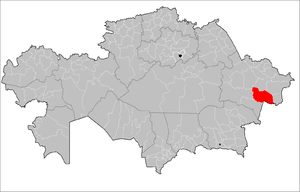Tarbagatay District
| Tarbagatay Тарбағатай | |
|---|---|
| District | |
 | |
| Country |
|
| Region | East Kazakhstan Region |
| Administrative center | Aksuat |
| Founded | 1928 |
| Government | |
| • Type | Akimat |
| • Akim | Tekeshov Yerlan |
| Area | |
| • Total | 9,200 sq mi (23,700 km2) |
| Population (2013)[1] | |
| • Total | 44,147 |
| Time zone | East (UTC+6) |
Tarbagatay (Kazakh: Тарбағатай ауданы; Russian: Тарбагатайский район) is a district of East Kazakhstan Region in eastern Kazakhstan. The administrative center of the district is the selo of Aksuat. Population: 44,147 (2013 estimate);[1] 47,125 (2009 Census results);[2] 65,589 (1999 Census results).[2]
Climate
Very continental. Winter is cold (in January average temperature −22 °С, −30 °С) and summer is hot (in July average temperature +25 °С, +35 °С). Very poor precipitation (200–300 mm/year) mostly in winter season[3]
Toponym
The name Tarbagatay derives from Mongolian (Tarbagan marmot) as marmot mountains. (Technically, tarbagatay means "with marmots" or "having marmots" in Mongolian, but tagh ~ taw ~ tay may be misinterpreted as meaning "mountain" by speakers of Turkic languages, such as the Kazakh language.)
Administrative-territorial system
17 rural districts, 65 villages.[4]
Demographics
Ethnic groups (2009):[5]
Economy
Agrocultural (meat, fish, flour, bread)
GDP 503 900 000 tenge ~ $3 427 900 (2008)[6]
Sights
- Borytastagan
- Syn-tas
- Atyn oba
- Alty oba
References
- 1 2 "Население Республики Казахстан" (in Russian). Департамент социальной и демографической статистики. Retrieved 27 December 2013.
- 1 2 "Население Республики Казахстан" (in Russian). Департамент социальной и демографической статистики. Retrieved 8 December 2013.
- ↑
- ↑
- ↑
- ↑
External links
- Subdivisions of Kazakhstan in local languages
- Statistic Agency of East Kazakhstan Region
- Akim of Tarbagatay District
- HB Paksoy, "Z.V. Togan: The Origins of the Kazaks and the Ozbeks," Central Asian Survey 11 (3), 1992
Read more: Culture of Uzbekistan - history, people, clothing, traditions, women, beliefs, food, customs, family http://www.everyculture.com/To-Z/Uzbekistan.html#ixzz1nh383uYB
| |||||||||||||||||
